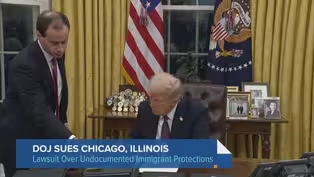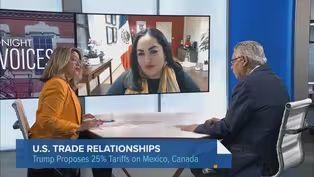Chicago Tonight: Latino Voices
How Mass Deportations Could Affect Illinois' Farming Industry
Clip: 2/6/2025 | 6m 46sVideo has Closed Captions
The U.S. Department of Agriculture estimates that 42% of farm workers are undocumented immigrants.
The Trump administration’s push for mass deportations has major cities like Chicago on high alert. But some residents in rural areas are also expressing concern — specifically farmers who are worried about losing their workforce.
Problems playing video? | Closed Captioning Feedback
Problems playing video? | Closed Captioning Feedback
Chicago Tonight: Latino Voices is a local public television program presented by WTTW
Chicago Tonight: Latino Voices
How Mass Deportations Could Affect Illinois' Farming Industry
Clip: 2/6/2025 | 6m 46sVideo has Closed Captions
The Trump administration’s push for mass deportations has major cities like Chicago on high alert. But some residents in rural areas are also expressing concern — specifically farmers who are worried about losing their workforce.
Problems playing video? | Closed Captioning Feedback
How to Watch Chicago Tonight: Latino Voices
Chicago Tonight: Latino Voices is available to stream on pbs.org and the free PBS App, available on iPhone, Apple TV, Android TV, Android smartphones, Amazon Fire TV, Amazon Fire Tablet, Roku, Samsung Smart TV, and Vizio.
Providing Support for PBS.org
Learn Moreabout PBS online sponsorshippush for mass deportations has major cities like Chicago on high alert, but some residents in rural areas are also expressing concern.
Specifically farmers.
We're worried about losing their workforce.
The U.S. Department of Agriculture estimates of 42% of farm workers are undocumented immigrants.
Joining us now with more on the potential impact our Rebecca.
She chief executive officer at the American Business Immigration Coalition.
And joining us via zoom is Stephen Door Lock professor in educational policy at the University of Chicago and the director of Stone Center for Research on Wealth and Equality and Mobility.
Thank you both for joining us.
Rebecca, I want to start with you.
How important is the immigrant workforce to the farming industry.
Thank you so much for having me.
Immigrants are critical to the farming industry.
Agriculture is a 3 trillion dollar industry and 72% of the AG workforce are immigrants.
You know, what do you say to those people who have, you know, many different opinions on what's going on with immigration, who should be no, who is legal and whos, not especially when it comes to such big workforce, like 4 main, right?
Well, we appreciate having egg seller shows.
mean, I'm having a hard time finding eggs right now.
And sure a lot of viewers are as well.
>> We appreciate having avocado is and milk and if you were to just remove a significant part of our farm workforce, we're going to start seeing $20 lettuce is $16 cartons of eggs or no milk because nearly all of the dairy farmers and farm workers here in our nation, including in Illinois, in the Midwest, are immigrants.
And Steven going to you what is what are the social logical and economic consequences at play here?
How do you break it down to someone was trying to understand?
>> Well, starting with the economy is already been pointing out.
Remove is 40% of the farmers.
The United States will inevitably cause substantial increases in food prices.
Nonpartisan organizations that have studied the effects of argued, I think credibility we had something on the order of a 10% increase in overall food prices.
This basic supply and demand.
In other there's really no controversy among economists that that's the consequence that one's going to face.
Now, the sociological facts more complicated to measure.
But nevertheless, there are profound you're thinking you know, the discussion of deportation is removed a million people, people from the agricultural sector out of the 2.2 million that work there.
And each one of those people has a family.
Each one of those individuals friendships are part of the communities.
And so one can talk about the effects in isolation on the food supply, the devastation of the communities because of the destruction of all of those social relationships to constitute communities is is a profound loss.
>> Rebecca, you did mention this.
But according to the USDA, nearly half of the crop workers and dairy farmers in the U.S. lack legal immigration status.
Why would mass deportations be detrimental to the agriculture workforce?
So currently we have over 400,000 open jobs in agriculture.
Our food processors along.
>> And so if you were to remove a significant portion of people that are already working, they're milking our cows.
Us 03:00AM in the morning.
And cows need to milk.
3 tied it 3 times a 365 days.
A week and if you were to remove people from this workforce, we're gonna see products that we love disappear from the shelves.
We're gonna see that we become a net importer of food and food.
Security is a national security problem.
so this won't just impact the immigrants in the communities which are extremely important, but is going impact the pocketbooks of every day Americans to find yourself having these conversations with people as of lately?
Yeah, absolutely.
And I think that is becoming clear to people because this isn't just a philosophical question anymore.
And we're starting to see workplace raids in North Florida, for example, I'm Barie Farm Citrus Farms.
We're seeing restaurants in Texas, for example, getting raided by ice.
So think people are gonna start really feeling the impact.
And Steven, with the domestic agriculture sector already struggling with labor shortages.
How would again deportations affect our economy?
>> Well, I think that the effects are clearly going to be negative.
The might, for example, that you're this specific one that you brought up agriculture, really losing a million workers.
Remember, these are workers that have skills and it's not a matter that those skills are going to replicate themselves and whoever might replace them.
That's going clearly caused a contraction.
There.
We're generally it is a myth to say that illegal or undocumented immigrants are somehow reducing the living standards of people.
There are citizens.
And the reason for that is undocumented.
People are not only.
They're both the producers and they're also consumers.
And so you think about the economy's in which individuals are buying things that producing things, their net for population as a whole studies of the effects of for to reduce the number of undocumented people in communities and systematically shown that anything, it harms the people that are left behind as lower demand, there's lower production and it's simply sinner economy in the center society.
>> Stephen, you talking personally from your experience, are there any frustrations when you are having these conversations with people?
similar question that asked Rebecca about, you know, who is a legal or not who should be deported or not?
>> I wouldn't say frustrations, but didn't on this specifically, but it's an example where.
Simply bad economics and bad social science particularly by, you know, people who policy community, our leaders.
>> And you know, perpetuate myths about the effects >> having undocumented people in the United States.
None of that is to say that there are not serious conversations to be had about the appropriate levels for society of of of legal immigration and kind of think about that.
What to do when you have 11 million people in the country.
But the claim these these that this somehow is harming the economy and the I think it's simply
DOJ Sues Illinois, Chicago Over Protections for Undocumented Immigrants
Video has Closed Captions
Clip: 2/6/2025 | 3m 37s | Chicago’s Welcoming City ordinance is designed to ensure all residents can obtain city services. (3m 37s)
A Look at the Potential Impact of Hiking Tariffs on Mexican Goods
Video has Closed Captions
Clip: 2/6/2025 | 8m 30s | President Donald Trump recently implemented a 30-day pause on 25% tariffs on Mexico and Canada. (8m 30s)
Providing Support for PBS.org
Learn Moreabout PBS online sponsorship
- News and Public Affairs

Top journalists deliver compelling original analysis of the hour's headlines.

- News and Public Affairs

FRONTLINE is investigative journalism that questions, explains and changes our world.












Support for PBS provided by:
Chicago Tonight: Latino Voices is a local public television program presented by WTTW

